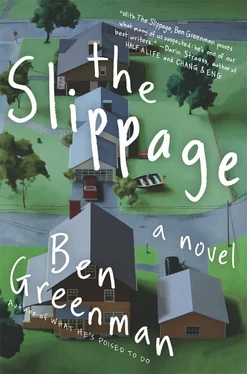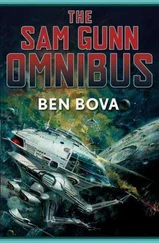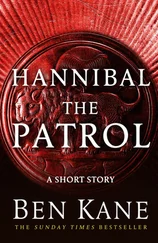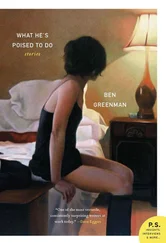A young man came in to call five minutes. Stevie put his face down into the ice bucket and came up breathing hard. “See you out there,” he said.
The neighborhood lined the apron of the stage. A woman in a pantsuit came to the microphone first. She explained how Arrow Automotive had used the same theme music since 1947. “It served us well,” she said. “But last year we all agreed it was time for a change. That’s when we first heard this marvelous song. It only made things sweeter to learn that it was written by one of our regional marketing managers. Please give him a warm welcome.” Ominous electronic music swelled and dry-ice vapor floated across the stage from right to left. Then, on the screen at the rear of the stage, the image of a firework bursting open, along with a sampled thunderclap. “ Flamma fumo est proxima ,” Tom said. Stevie sprang up the shallow steps. He had changed into a black Arrow T-shirt. He looked like he’d been lifting weights. His guitar strap was patterned Navajo. “Rock star,” Graham Kenner yelled.
“Hardly,” Gloria Fitch yelled, just as loud.
Stevie basked in the glow of his specialized popularity. He picked out a note or two, then stilled the strings with the flat of his hand. “How are you all doing tonight?” he said. “I didn’t write this song with cars in mind, but maybe the cars had me in mind.” He strummed a chord. “This song is the new theme of Arrow Automotive, a leader in quality American automobiles since 1931. I hope you like it.”
The first thirty seconds were purely instrumental, and William almost found himself humming along. Then Stevie lifted his head and started to sing:
When times are dark, it fuels our pride
A light that’s shining nationwide
It keeps us walking on the straight and narrow
We don’t need a second chance
To make the most of circumstance
The truth comes straight ahead just like an arrow
When Stevie reached the end of the verse, he paused. A floodlight doused the room in blue, revealing a drummer behind him, previously unseen, and Stevie grabbed the microphone with his right hand for the chorus: “Every time I stand, it’s for America,” he sang. “It stands for every single thing I love.” A man with a gray goatee held a plastic cup aloft, his index finger extended. A woman, her face lit by her cell phone, took video. There was a second verse that had an even higher incidence of patriotism than the first, and then a second chorus. Afterward, Stevie played an instrumental version of the original Arrow theme.
“I read that it was composed to mimic the sound of a car coming across a bridge,” a woman next to them said. “It was Pittsburgh and they have hundreds of bridges.” She had freckles on both cheeks and plenty more to say but William didn’t catch any of it; it was as if someone was cutting a lawn of words and those were the clippings that were flying out of the top. Tom leaned in and said something, and the freckled girl wandered off.
“What did you say?”
“I told her to go by the bar and I’ll meet her there,” he said. “Now I’m going to get a drink.”
“And I’m going to get rid of one,” William said. He passed Graham Kenner, who was too close to Helen Hull in the corner of a booth. William couldn’t hear what he was saying, but it was putting a dreamy smile on her face. He went farther down the hall, turned at the end, and there stood Emma, in the dogleg by the bathrooms. She was as round as a raindrop. William stiffened from shoulder to shoulder. He considered running. But when she turned, he was still there, and he waved with a hand that felt suddenly tiny. “Hi,” he said.
“Did you enjoy the show?” she said. Her face had grown fuller with her body.
“Did you?” he said.
She considered him for a minute, pursing plump lips, and disappeared into the nearest door. William glanced around the hall: its red paint was peeling to show other colors underneath. A corkboard advertised upcoming shows, as well as items being sold by musicians. Would he pay three hundred dollars for a “used amp almost new”? The wall was giving him a headache.
Emma emerged, too soon for almost anything. She had a piece of paper in her hand, and she thrust it toward William. “What is this?” William said.
“A note,” she said. But it was a paper towel with a childlike drawing on it that he slowly came to recognize as an octopus. “I want you to read it.” A button popped high on her sweater and one heavy breast swung toward him. She seemed drunk but that was impossible. “Listen,” she said. “I have a story for you.”
“Okay,” William said.
“It’s going to take a minute.”
“A minute’s not going to kill me,” he said, hoping he was right.
She took a deep breath. “A few weeks ago, I was driving by that park where we spent the afternoon,” she said. “I was thinking about you, wondering about why I spent time with you. I couldn’t think of any reason at all, not at first. But then in the park I realized: it was because you gave me freedom. I loved the idea that I could change my life, and I liked you for helping me get closer to that idea.” He started to agree, but she waved him silent. “And now the baby’s close, and the bigger I get the smaller I get, and I don’t see how I’ll ever be able to change anything again.” William held the octopus paper out to Emma. She stepped back, just one small step, but it was enough to prevent her from taking the paper from him. The relief in her eyes was enormous, like someone thrown free of a wreck. She went back into the party without tears or anything else.
The Fitches were dancing in a corner of the club, moving to different music than the music that was playing over the loudspeakers. They were bathed in a lunar blue. Gloria swung her head from left to right and back again. “Look at them,” Louisa said. “Want to dance?”
“I think the party’s over,” William said.
A look came over Louisa’s face like it was the saddest thing she had ever heard. “Okay,” she said. “Have it your way. Let’s go get Tom.” Louisa said. Tom was firmly installed at the bar with the freckled girl, and he patted the stool next to him to show William and Louisa where to sit down.
After that, William remembered little: two beers, then another, then a glass of whiskey pressed into his hand, warm and mean, then Tom’s knees snugged around the freckled girl’s calf. Eventually, they left Tom there, entangled, and Louisa complained bitterly the whole way home that he needed to grow up, that he would never grow up, that he was worse than a child, that it was her job as a sister to point it out and she didn’t know why the freckled girl couldn’t see it.
The whiskey tugged on William’s sleeve to remind him of the beers. He was out on the deck, and Louisa was in the house, still sleeping. When he called to wake her up, she hung up on him, and he listened to the Buddhist drone of the dial tone.
Earlier in the morning, he had seen what he thought was his favorite bird, the high-whistler, perched on the edge of the lion tub, and when it reappeared in the grass by the eagle he decided to go down into the yard for a better look. When he came back up, Louisa was in his chair. “I’m feeling a little woozier than I’d like,” she said. “How about you?”
“Same,” he said. “A little worse before, a little better now. Sunlight is the best disinfectant.”
“Alcohol is a pretty good disinfectant,” Louisa said. “I was all snugged in last night when we got home. That’s the best thing about drinking. It changes the outside by changing the inside.”
“Sounds like something your brother would say.”
“I think it’s something he has said,” Louisa said. “Listen: I had a dream. Well, an idea.”
Читать дальше












